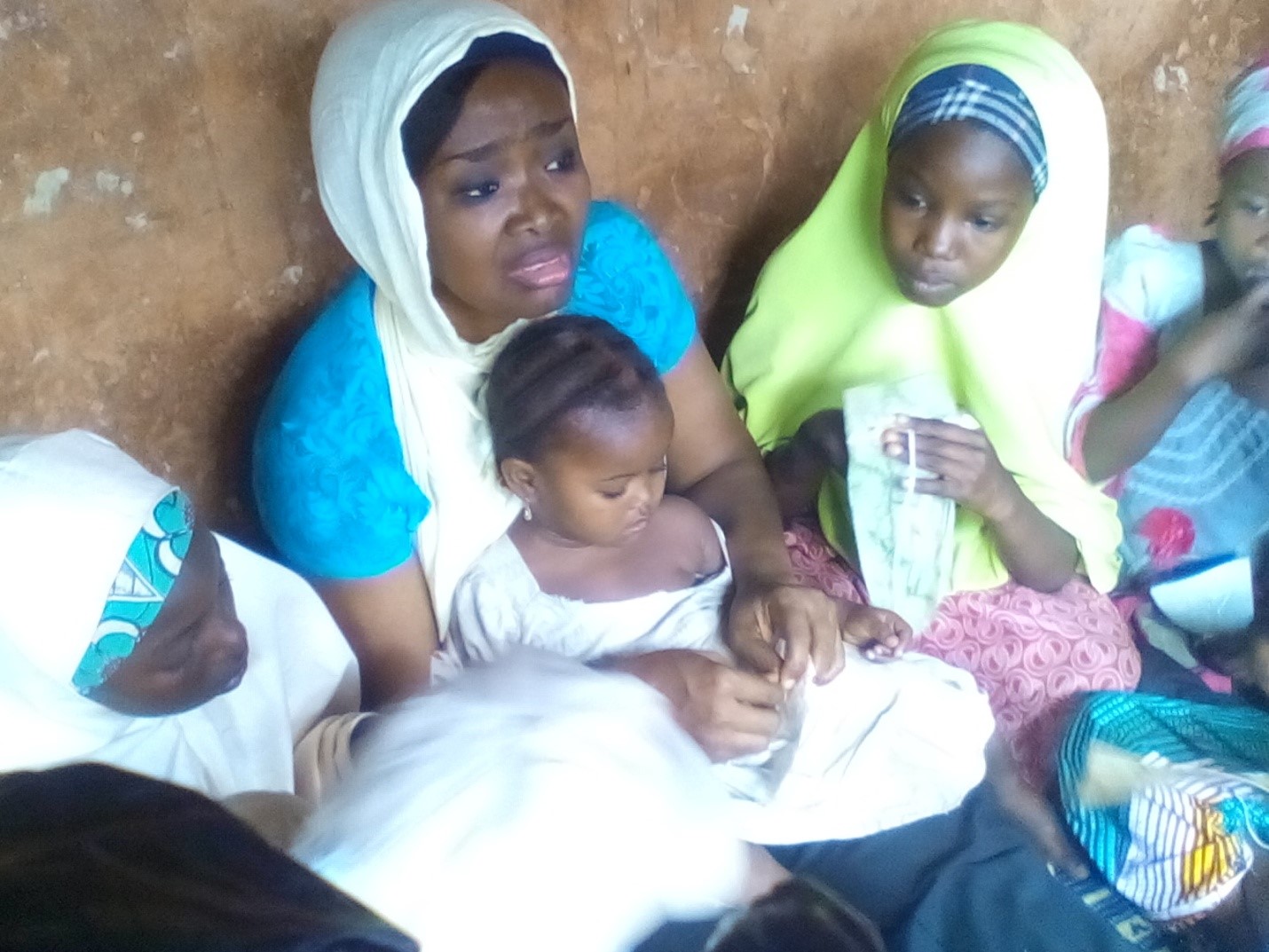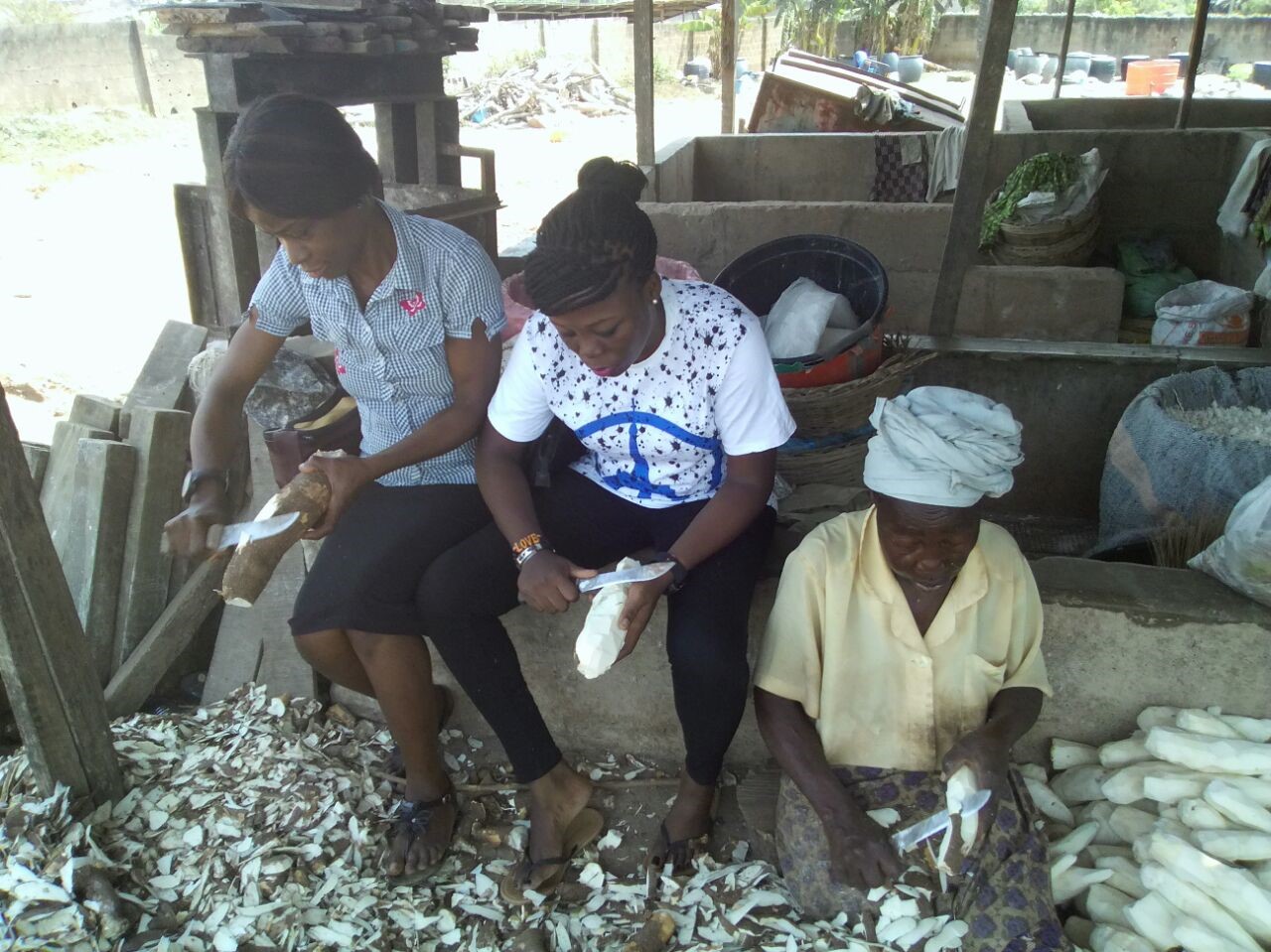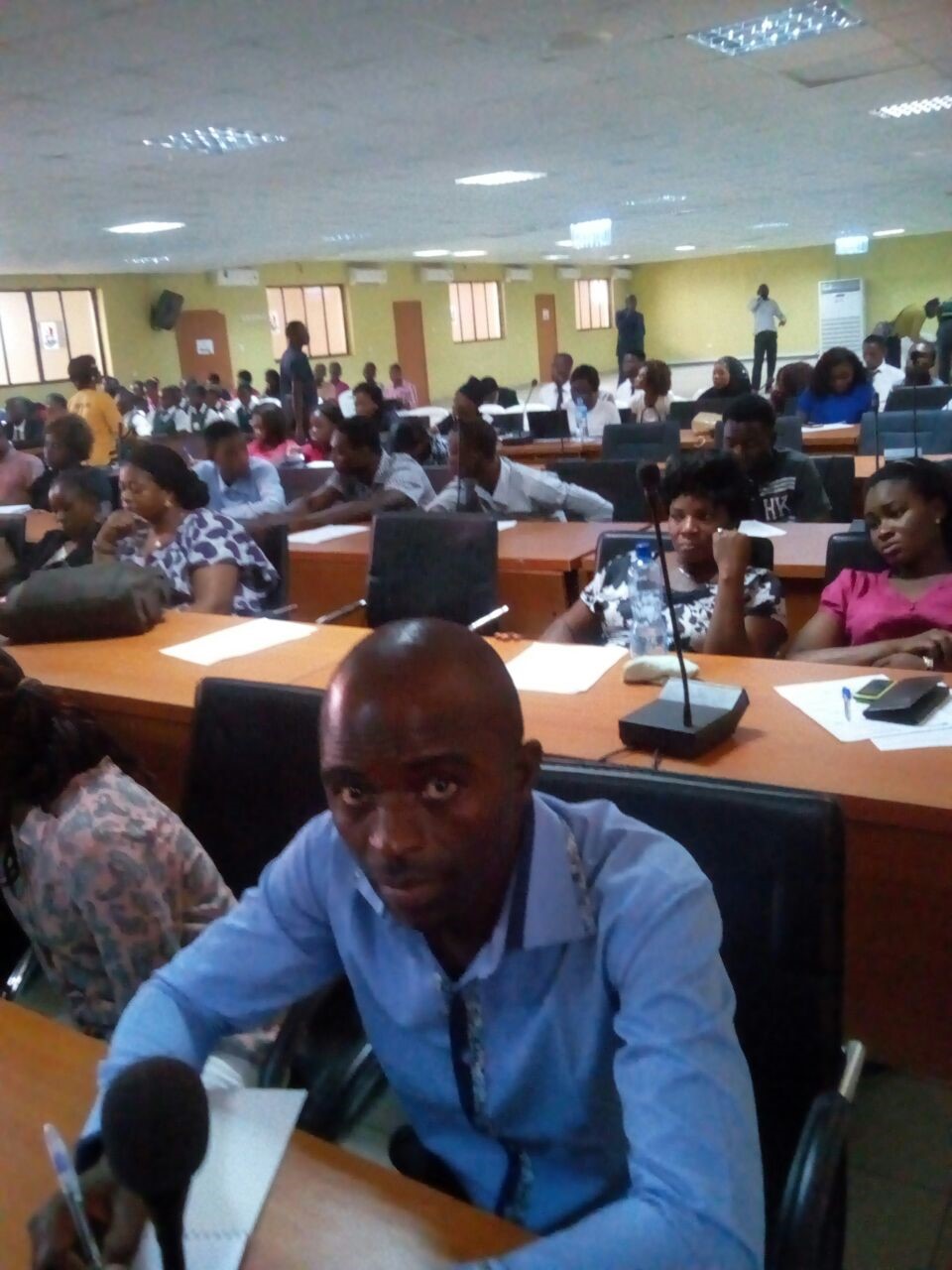Dr. Oti Adepeju of GYLGF in Nigeria – empowerment of women and girls
Denise Nanni, ProMosaik. In the following our interview with Dr. Oti Adepeju of
the Global Youth Leadership and
Girl-Child Foundation in Nigeria, engaged against youth enemployment, and
for girls and women empowerment in Nigerian society. Dr. Adepeju explained us
the reasons why there is so much un-employement in her country, and presented
her projects and strategies to address the phenomenon. Would like to thank her
for her time and the photos she sent us. To know more you can visit youtube and facebook. For a healthy society we need educated women and girls. This is the future we have to dream about and struggle for.

What are the main causes of youth un-employment
in Nigeria?
There are many causes and reasons for
youth unemployment in Nigeria. One of which is lack of planning; the actual
population of Nigeria is still hinged on speculations and not actual figures. A
nation that does not know how many people it has, how the people will be
catered for in the annual fiscal budget, social policy and other developmental
indices. One other cause is lack of political will to put in place key policies
that will ensure industrialization in all sectors of the economy. Nigeria is
said to be a consuming nation and we are living up to it. Other nations dump
their finished products on us, therefore, creating unemployment for our
citizens.
Nigeria are not purchased by Nigerians because Nigerians have exotic taste for
foreign products, and some of the
products cannot compete favourably with imported products. The international
markets have high standards so much so that many of our products cannot be exported.
One major area that cannot be ignored is power generation. Successive government
has expended so much resource on electricity to no avail. The nation struggles with
power outages, this makes it difficult for industries to thrive, in fact many
industries have shut down in recent time and many have relocated to Ghana,
China, and other neighbouring small countries where they can get power and other
logistics which will make their products come out at minimal cost.
or shutting down, people are sacked, left redundant or resort to work for
several months without pay. In most countries of the world and in Nigeria of
the 40s, 50s and 60s, agriculture was the major employer of labour especially
in less industrialized nations like Nigeria, but as soon as Nigeria discovered
oil, the grundnut pyramid disappeared in the north, cocoa from the south, coal
from the east, other natural deposits like bitumen, iron ore, rubber, oil palm
also went into extinction. Crude oil became the main stay of the Nigerian
economy. As if this was a curse rather than a blessing, Nigeria could not
sustain refining its own product; imagine if all the four refineries in Nigeria
were working to full capacity, how many youths would have been employed. In the
Nigerian civil service; which is the largest employer of labour, people often
come in with falsified age, so the aging workers refuse to leave and the
younger ones cannot come in.
its fight against corruption and the agriculture policy which is focused at
making agriculture enticing to the youths, but more still needs to be done. We
(the youth) cannot be expected to go back to cutlass and hoe subsistence
farming. Government have to provide the enabling environment with the provision
of land, equipments and tools, machines and tractors, security , farm to
markets roads, capacity building, and readiness to buy the produce off the young
farmers.
processes is wastage, we lack the capacity for adequate food preservation,
crops are cheap and affordable while they are in season. Furthermore, our
universities and other institutions of higher learning need to be proactive in
training graduates for self-reliance, the school curriculum teaches more of
abstracts without relevance to the immediate needs of the community, hence
there is a wide gap between society’s needs and what the institutions are
teaching, many graduates are unable to apply what is taught in the classroom to
the realities in the work place and in the larger society.

Participants at the
Self-Employment Skill Acqusition and Capacity Bulding Workshop II, University
of Ibadan.
Prior community service activities
cumulated into the establishment of GYLGF. The journey started in 2001 with
Action Research Training and Development Centre. It was established with the
aim of building the youth and adolescent capacity to make informed decisions
and choices regarding their sexuality and careers; myself and few other friends
were in the vanguard, we organised talks in schools, educational/career
excursions and sexuality education talks in schools. The year 2005 signaled a
detour and the exclusive focus on youth and women empowerment. This arose as a
result of my engagement as a volunteer worker in a church of over 1000
population, where about 40 percent of the youth population were either unemployed
or under employed. So I took the burden of organising soft skills acquisition
workshops, where they were taught how to construct winning Curriculm Vitae, prepare
themselves for job interviews. We also organised entrepreneurial skills workshops
for those who wanted the self-employment option. Thereafter, I started free
placement services for applicants, linking them with potential employers. About
30 percent of our applicants got employed in various organisations. Meanwhile,
school based career/sexuality talks continued in selected schools in Ibadan Metropolis.
All these activities were carried out under the aegis of Leading Edge Global
Resources Limited. Even though our work was charity based, we could not muster
the funds to register as a charity with the government, so we faced several
challenges when asking for partnership and collaboration form international
NGOs. However, that did not stop our work of alleviating the suffering of the
unemployed youths and vulnerable girls and women. In 2014, GYLGF was registered
as a non-profit with the Nigerian government, giving us full capacity to
function as a nonprofit.
Our Vision: GYLGF envisioned
a society where the potentials of youth and girl-child are fully developed and
supported to become socially responsible, responsive, able to lead self and contribute
meaningfully to healthy society.
the best ways in order to empower girls and women?
jacket approach. Nigeria is a multi ethnic, multi religious society; therefore,
it depends on the environment in which one is operating. However, we know that
poverty is synonymous to women and poverty is not a respecter of religion or
ethnicity. I think the best way to empower women is to tackle poverty in their
lives, by enhancing their capacity to be economically productive or enhance
their existing business for them to earn more. Poverty is not just about money,
I believe there is also cultural poverty, because some women have the where
withal to send their children to school, but they will not because to them,
education does not yield immediate reward. Therefore, they need to be sensitized
on the importance of educating their children, especially the girl-child. The
best way to empower girls is to encourage them to finish each stage of their
education to the highest possible level, because that is the beginning of
emancipation of the mind and intellect. Although education is not a panacea to
all social problems, but its power to liberate, equate and illuminate cannot be
over emphasized. Therefore, we encourage girls to shun all distractions, face
their studies and finish well. Radio programmes and drama series is another
way, but we will need partners in this regard.

One of our girls (Toluwanimi
Ayeni) sent on scholarship to Eleanor Rosevelt Girls Leadership Worldwide, New
York.,USA 2014

Winners of Essay and Creative
Art Competition from Queens School Apapta, Ibadan, from left Dr. Adepeju Oti,
middle winners from Queens School, Apata and Right Mr. Seyi Soremekun of the
United Nations Information Centre, Lagos, Nigeria. Dec. 10, 2016 in
commemoration of the 16 days activism.
dropout? If yes, how do you address this issue?
will bring it to the doorstep of poverty again. Parents who are well to do
would not put their children to labour in such a way that it will affect their
education negatively. African parents and indeed Nigerians have always involved
their children in their farm work or petty trade and it is not even considered
as labour. It becomes labour when the child’s survival as a young family member
depends on that labour, when children would be on the street hawking during
school hours, when the labour becomes primary and the child’s education
secondary. Another reason which is also connected to poverty is early marriage
of girls, traditionally the suitor will bring bride price and other gifts and
of course that is minus one or two mouths to feed. Teenage pregnancy is another
reason for dropping out of school. In the part of Nigeria, where I live, among
rural and urban poor; children are encourage to start trading very early, and
once they start earn little money, they drop out of school because of the
immediate financial gratification. We educate and inform girls on what they
stand to lose by falling prey to early marriage or teenage pregnancy in our
seminars and workshops. Right now, we are under studying a semi-rural community
of Akinyele Local Government in Ibadan Oyo State, we are studying the marriage
pattern and economic activities of women and how these impacts on their
families livelihood. The other method we employ to solve some of the problems
is through our Adopt-A- Girl Project, where partners donate to cover school
expenses of vulnerable, but brilliant girls they adopt.
our outreaches on child labour

carrying a pot in Sokoto, Sokoto State

Dr’ Oti, at the leather
factory in Sokoto where 90% of the workers are children who have never attended
conventional school and don’t intend to.
and institutions? If yes, how?
we operate in, with the Ministry of Women Affairs and the Ministry of
Education. When we need to work with the schools, we go through the Ministry of
Education. At the grassroots, we are working in collaboration with some local government
and federal constituencies to train youths in entrepreneurship and self
reliance. We will be working with the Akinyele LGA very soon as machinery is
being put in place. We work in cooperation with INGO like the British Council
Active Citizens Programme, United Nations Information Centre, Lagos and
Association for Reproductive and Family Health. One major setback we have is
funding, we need partners and collaborators who will help fund some of our
lined up projects.
team at the Stop Hunger Cassava Processing Factory, owned by Stop Hunger
Women’s group. Akinyele Moniya, Ibadan.

Council Career Advancement and Active Citizens seminar. November 19, 2016. Lead
City University, Ibadan.



